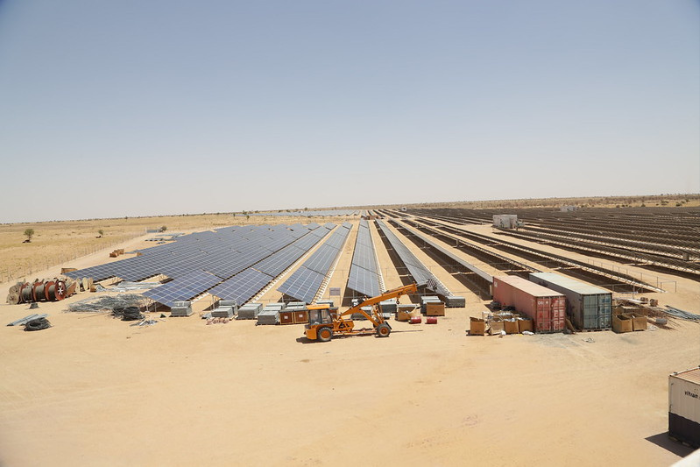Using the concepts of consultation and consent, the paper examined how India’s intentions for a people-centric, equitable, and just transformation align with its goals for renewable energy
India has one of the world’s most ambitious renewable energy expansion plans. The country intends to build 500 gigawatts (GW) of non-fossil energy capacity in order to reach net-zero emissions by 2070 and meet 50% of the installed capacity from non-fossil fuel-based energy resources by 2030. A new paper has looked at the ways to advance fair and equitable large-scale renewable energy development in India.
The availability and accessibility of land are critical to the planning and implementation of such massive undertakings. In the effort to meet aggressive climate targets, ecological devastation, the escalation of preexisting vulnerabilities, and the formation of new patterns of land and livelihood dispossessions are being referred to as “collateral damage”, the paper said.
Using the concepts of consultation and consent, the paper examined how India’s intentions for a people-centric, equitable, and just transformation align with its goals for renewable energy.
The reality on-ground
The paper examined the type of consultation and involvement that are suggested by the legal and policy framework that is presently guiding India’s growth of renewable energy. The paper found that India’s policy and regulatory interventions maintain some degree of recognition of the need for consultation and consent principles on paper.
Their operationalisation on the ground is still deficient, though. It is clear from the continuous marginalisation of frontline towns and the disputes that are breaking out over a number of the nation’s major wind and solar projects, the paper said. There are social and environmental externalities throughout space and time as a result of consultation procedures that are largely insufficient, ignorant, exclusive, and unfair.
India’s public and private institutions responsible for renewable energy expansion are willing to overlook procedural and distributional injustices that often result when policy has a singular focus to expedite the delivery of renewable energy. This also suggests policy complacency, wherein local effects and ensuing inequities are accepted as both inevitable and acceptable, the paper pointed out.
The paper said that despite their existence, constitutional rights have not always been upheld by meaningful interaction and consultation with Adivasis, Dalits, and other frontline groups who are losing their land, means of subsistence, biodiversity, and local autonomy due to renewable energy expansion. If left unchecked, the paper said, this may construct a new kind of “climate apartheid that locks in the suffering of marginalised populations”.
Often considered a “blueprint for other developing economies”, it can be misleading if India normalises processes that ignore the implementation of social and environmental safeguards in renewable energy expansion, the paper warned.
Path to fair and equitable large-scale RE development
The majority of Indian states have created policies pertaining to wind and solar energy. Nonetheless, these policies continue to have a strong technocratic focus to promote renewable energy development projects because of the urgency of the climate imperative, the paper said. The paper further recommended that a consultation and consent framework can help clarify the boundaries of this perspective. Such a framework can pinpoint the circumstances and unacceptable conditions that can guide the development of renewable energy policies nationwide in the future.
According to the paper, when these rules are implemented on the ground, more funding is required to support due diligence and accountability procedures. Extended policy attention is specifically needed for the distribution of impacts, which includes identifying and preventing harm for marginalised frontline populations.
The paper claimed that prior experiences with the extractives sector demonstrate a variety of effects, such as long-lasting disturbances to local and regional well-being, widespread displacement brought on by food and water insecurity, stranded projects with abandoned landscapes that present serious social and environmental risks, and frequently, entrenched expressions of conflict.
Frontline mining villages in India have seen a variety of social and environmental effects as a result of lax regulatory oversight and poor corporate management. To prevent making the same mistakes, it is crucial to learn from the extractives industry’s experiences.
Socio-economic data remains old and patchy, and where available, lacks granularity, the paper found. Without a robust evidence base, the design of critical fiscal and development policies remains arbitrary and misaligned with ground realities. So, investing in data to inform decision-making can be a gamechanger.
The paper said the promoting inclusion of frontline communities through new forms of partnerships that safeguard rights is vital.
About The Author
You may also like
India says it won’t rely on global climate or pollution rankings to shape policies
Non-Fossil Fuels Generates One-Third of India’s Electricity in 2025
COP30 Kicks Off With Hard Talks on Money, Adaptation and Global South Leadership
India on track to achieve 2030 clean energy target
COP30 should be the COP of adaptation, says environment minister Bhupendra Yadav

